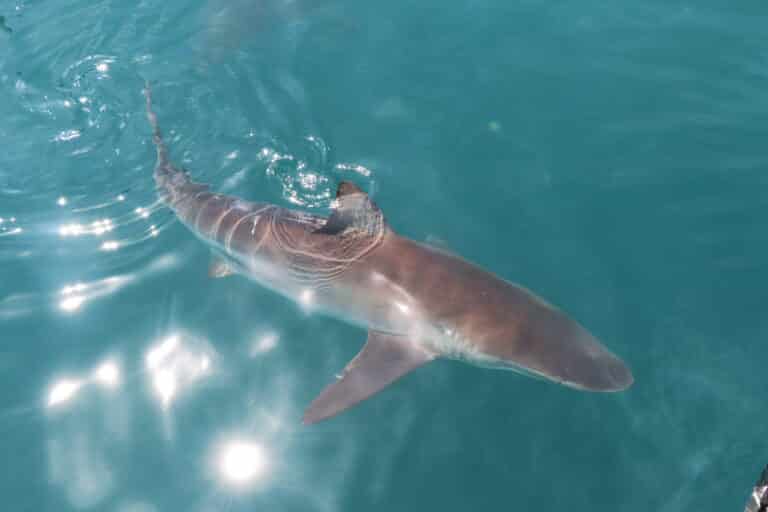By Courtney Cooper
The Role of Sharks in Marine Ecosystems
Sharks are top-level predators that control the numbers of other marine animals, thereby maintaining the stability and diversity of the ecosystem. In this article, we look at the role of sharks in marine ecosystems.
We also discuss further shark facts that you might be interested in! Apex Shark Expeditions provides the best great white shark cage diving in Cape Town.
Ecological Importance of Sharks in Marine Ecosystems
They are often referred to as the “guardians of the ocean” due to their role in maintaining the balance of marine ecosystems. Sharks contribute to the maintenance of population health and the preservation of a balanced marine food web by targeting sick, weak, and elderly individuals across different species, hence preventing the overabundance of any particular species.

The occurrence of sharks in South African waters is notably significant. The nation’s shoreline harbours a wide variety of shark species, including the renowned great white shark (Carcharodon carcharias).
A recent study has brought attention to the possible changing geographic range of great white sharks along the South African coastline. Researchers have indicated that these sharks are shifting their presence from conventional high-activity regions like False Bay to emerging locations like Algoa Bay. This alteration is hypothesized to be a reaction to altering environmental conditions and predation pressures exerted by orcas. There is another study that suggests rather than the sharks shifting their locations, they are in fact being killed by the demersal long liners. Either way, the migration of sharks to other regions or the lack of sharks due to other factors can have substantial ecological consequences, as it modifies the dynamics of nearby marine ecosystems.
Sharks play a crucial role in marine ecosystems by exerting impact on the behaviour and distribution of other marine animals. For instance, the existence of sharks can induce prey species to evade specific regions, resulting in alterations to feeding and reproductive behaviours. The “landscape of fear” phenomenon plays a crucial role in preserving the diversity and structure of maritime environments.

The decrease in the observation of great white sharks in certain regions of South Africa has sparked worries regarding the potential repercussions on the local ecosystems. The decline in shark populations in False Bay has resulted in a rise in the population of Cape fur seals (Arctocephalus pusillus), which once served as a food source for great white sharks in this area. The rise in seal population can have a ripple effect on the ecology, leading to higher levels of predation on fish populations and increased competition with other marine predators.
Sharks also have a crucial function in the process of nutrient cycling in marine ecosystems. Sharks play a role in the redistribution of nutrients in the water when they consume their food. The process, referred to as “biological pumping,” is crucial for sustaining the productivity and well-being of marine ecosystems.
Sharks encounter a multitude of challenges, such as excessive fishing, the degradation of their habitats, death by demersal long liners, and the impacts of climate change. South Africa has implemented measures such as the creation of marine protected zones (MPAs) and limits on shark fishing to safeguard shark populations. These methods are intended to secure the enduring survival of shark species and the conservation of their ecological functions. But is it enough?
Recent data emphasize the significance of these conservation endeavours. A 2022 study disclosed that white sharks in South Africa allocate almost 15% of their time in the vicinity of longline and gillnet fisheries, which provide substantial threats to their numbers. The KwaZulu-Natal region had the greatest number of white shark captures, with an average of approximately 32 each year. These statistics emphasise the necessity of removal of the ‘Shark nets’ and continuous monitoring and conservation efforts for shark populations in order to avert further decreases.
Sustained study and conservation endeavours are necessary to safeguard these extraordinary species and the environments they sustain.
We also explore how Marie Christine Levine contributed to shark conservation.




